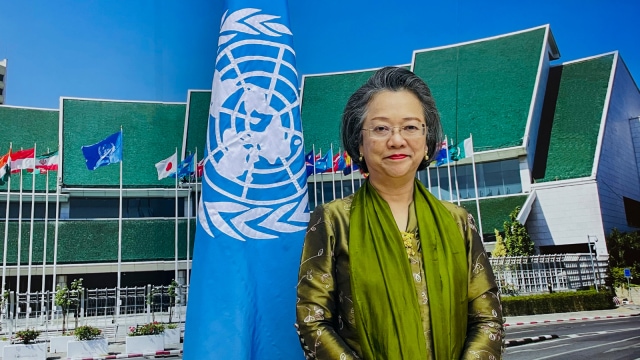Gender stereotypes, unequal power relations still remain; obstructing path to gender equality: Top UN official
The under secretary general noted that in 1995, the Beijing Declaration became the world's most powerful vision for gender equality, laying out a comprehensive path to securing equal rights and opportunities for women and girls.
 UN Under-Secretary-General Armida Salsiah Alisjahbana also warned that not all news is good news as we celebrate
UN Under-Secretary-General Armida Salsiah Alisjahbana also warned that not all news is good news as we celebrateSignificant progress has been made in women empowerment but persistent gender stereotypes, discriminatory norms, and unequal power relations remain deeply entrenched, obstructing the path to gender equality, a high-ranking UN official said here on Thursday. In an interview with PTI on the sidelines of the UN Ministerial Conference here ahead of next year’s 30th anniversary of the Beijing Declaration and Platform for Action, UN Under-Secretary-General Armida Salsiah Alisjahbana also warned that not all news is good news as we celebrate.
“Over the past three decades, this framework has not only shaped national policies but has also inspired legal reforms and guided efforts at the global, regional, and national levels toward advancing gender equality “But as we celebrate, we must confront a sobering reality that not all news is good. In many areas, progress has been uneven and, in some cases, fragile,” she said on the margins of the three-day conference that began here on Tuesday.
“We cannot ignore that more than one in four women in our region have faced intimate partner violence, a grave violation of their dignity, safety, and fundamental human rights,” Alisjahbana, who is also the executive secretary of UNESCAP, added. Alishjabana noted that we certainly cannot ignore persistent gender stereotypes, discriminatory norms, and unequal power relations that remain deeply entrenched, obstructing our path to gender equality.
Talking about progress made by countries in Asia Pacific since the Beijing declaration, the top UN official said that more girls across Asia and the Pacific are in school today than ever before and maternal mortality has dropped by a third since 2000. “It means, countless mothers are surviving childbirth and thriving with their families.” “Unfortunately despite the significant progress in the past decades since the Beijing Declaration, many challenges remain.
“Girls still are disadvantaged compared to boys in terms of education, especially as you go up the ladder of education. Also in terms of employment overall, for example, labour force participation of women is still lower than men, and in certain countries, is even much lower,” she said, drawing attention to the pay gap between men and women for the same jobs.
Asked about India’s progress, she said that the country has made significant progress in various areas, including economic empowerment and political representation but “the challenges are same as is the case with other countries.” “Since India is a big country with the largest population, the challenges are also still immense,” she said.
Alisjahbana further noted that the pandemic disproportionately affected women and men because the women had to shoulder the biggest share of the burden. But, now that the pandemic is over, “it is not quite normal … (it is) a quite different normal, including in terms of the way we work, and also in terms of various economic opportunities,” she said.
The Conference brought together over 1,200 delegates from governments, civil society and youth groups, the private sector, and academia to discuss progress and priority actions to support gender equality and women’s empowerment. It is jointly organized by the United Nations Economic and Social Commission for Asia and the Pacific (UN ESCAP) and UN Women, ahead of next year’s 30th anniversary of the Beijing Declaration and Platform for Action.



- 01
- 02
- 03
- 04
- 05




























